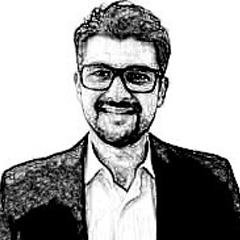Death is the ultimate reality of human life. No matter how powerful or healthy a human being is, everyone gets a taste of the bitterness of death. As old age approaches, senility sets in. The average age of a person in Pakistan is 60 years old. The leaders of the three biggest political parties of Pakistan are over the age of 60. These political leaders will not be as active after 10 or 15 years as they are today. With this in mind, concerns about the political future in Pakistan arise.
Preparing the next generation of politicians in Pakistanis imperative. At the moment, Bilawal Bhutto Zardari is leading the Pakistan People’s Party (PPP). He is 29 years old. Nawaz Sharif’s daughter, Maryam Nawaz, is 44 years old. Shahbaz Sharif’s son, Hamza Shahbaz, is 43 years old. There are currently no political heirs for Pakistan Tehreek-e-Insaf’s (PTI) chairman Imran Khan on the horizon.
On the whole, political parties have not been able to produce a new political generation. Pakistani political parties, with some exceptions, are marked by hereditary politics and a lack of meritocracy. The main reasons behind this include the cultural trends of politicians to stay stuck to politics and power until their last breath.
In 1974, the students’ union ordinance was introduced in Pakistan. Students’ unions had existed in educational institutions before this. On February 9, 1984, during Zia’s rule, a ban was imposed on students’ unions in educational institutions. Since then, no government has taken an interest in getting rid of this this unjust ban. The ban on students’ unions in educational institutions and restrictions on their political activities has made the new generation apathetic to politics. Developed countries have no bans imposed on the political activities of students. The youth are provided political roles in their universities.
The absence of students’ unions has given space to ethnic and extremist organisations to take root in educational institutions. Due to this, the schism between students on the basis of ethnicity and linguistics is widening
Many prominent political leaders from the major political parties of the country entered into the practice of politics from students’ unions. These include Sheikh Rashid, Javed Hashmi, Farid Paracha, Saad Rafiq, Ayaz Sadiq, and Jehangir Badar (Deceased).
Unfortunately, there is a lack of political student leaders amongst the new generation. The Pakistan Muslim League Youth Wing recently staged a protest because the youth wing had not been given due recognition in the party. The absence of students’ unions has given space for ethnic and extremist organisations to take root in educational institutions. Due to this, a schism between students on the basis of nationality and linguistics is widening. Recently, the hike in university fees of Quaid-e-Azam University was protested.
The incident turned into an ethnic conflict where the collective student protest, resulted in Baloch students being isolated from the rest. This is a dangerous situation. Students have been deprived of the chance to play a constructive political role by joining likeminded groups on the basis of a political ideology.
The absence of national politics in educational institutes is deepening ethnic fault lines. Politics and democracy are two factors which keep a country united. Outside of educational activities, the next generation seems to be spending its time on frivolous entertainment, such as social media. The younger generation needs to increase its political participation to assume leadership roles and play an active part in the development of their country.
Of the political heirs in the Pakistan Muslim League-Nawaz (PML-N), Hamza Shahbaz Sharif has done noticeable ground work in Punjab. Despite his efforts, he seems to have failed to achieve the same level of recognition as Maryam Nawaz. No doubt Maryam Nawaz was born into a wealthy family and therefore did not have to undergo the harsh political struggle of Benazir Bhutto, but she has shown herself to be a politically powerful leader by taking a clear and aggressive pro-democratic stance. Even her political opponents clandestinely acknowledge this. Maryam Nawaz has proved herself both at the national and international levels. The New York Times recently declared her among the eleven most influential women in the world.
Bilawal Bhutto, the chairman of the Pakistan People’s Party, is much younger than Maryam Nawaz and has spent most of his life out of the country. He needs more time to understand the politics in Pakistan. Being the successor of two political giants and martyrs sets him apart from his political rivals. If he keeps working hard and following in the footsteps of his mother and grandfather — adopting their style of people’s politics — he could rise to be a very influential politician in the future.
Pakistan needs the young to be energetic and politically aware. Perhaps the anti-democratic powers do not want this to happen. Political nurturing of the young generation is empowering and enables them to take a stand against the anti-democratic forces. It is the younger generation that can bring about real social change and break the recurring political cycle. Politicians need to stop thinking about consolidating their own power and start thinking about the democratic future of the country. They need to take steps to create political awareness in the youth of the country. The first step of this is to invest in the future by reinstating students’ unions.
The writer hosts a current affairs talk show on PTV News. Follow him on Facebook at: www.facebook.com/syedzishanhyder
Published in Daily Times, January 9th 2018.

